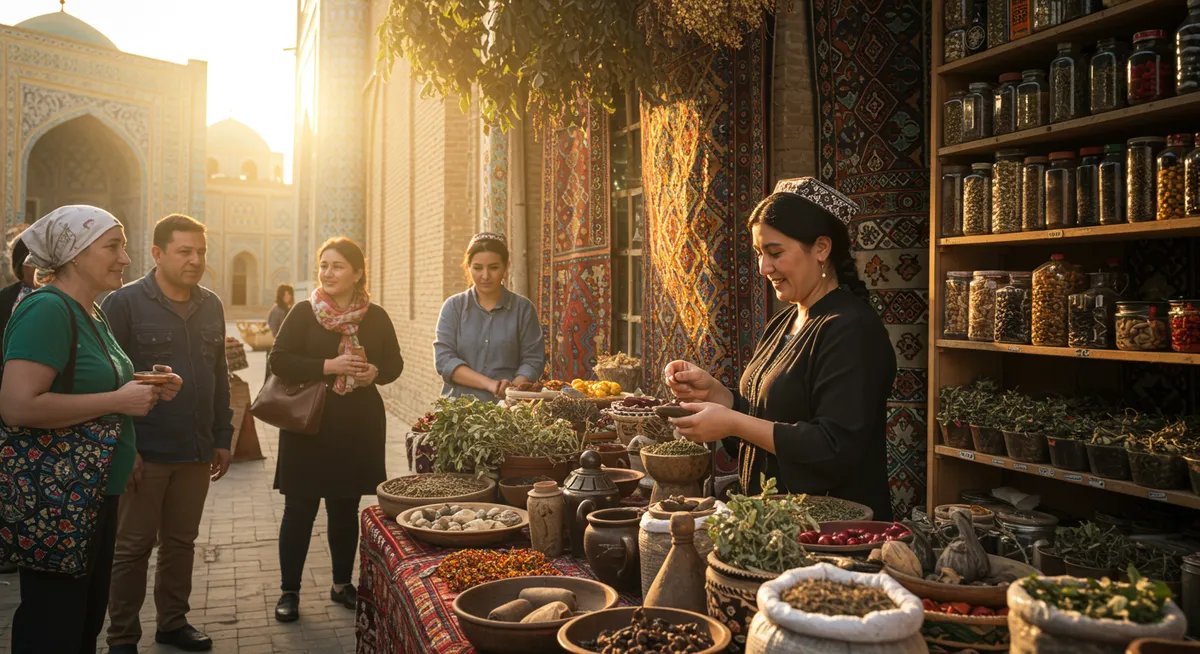
Traditional Uzbek Healing Practices in Samarkand
Table of Contents
Want to find the best travel deals for this destination? Chat with our travel hacking specialist!
Get Travel HacksCategory: traditional-uzbek-healing-practices-samarkand
Unveiling Traditional Uzbek Healing Practices in Samarkand: An Ancient Path to Wellness
Having explored numerous ancient healing traditions across the globe, I can attest that Samarkand, Uzbekistan, holds a particularly rich heritage of wellness. This city, once a pivotal stop on the Silk Road, has long been a crucible of knowledge, blending influences from Persian, Arab, and local Turkic cultures. When you delve into the traditional Uzbek healing practices Samarkand offers, you uncover a holistic approach that intertwines physical remedies with spiritual well-being. From ancient herbal knowledge passed down through generations to therapeutic physical techniques, Samarkand's healing legacy provides fascinating insights into a time-honored path to vitality. Enhance your Samarkand wellness experience with our Samarkand itinerary. Enhance your Samarkand wellness experience with our Samarkand itinerary.
Roots of Healing: Ancient Wisdom of Avicenna
The foundation of traditional Uzbek healing practices in Samarkand is deeply rooted in the medical philosophy of Ibn Sina, known as Avicenna, whose 11th-century Canon of Medicine was a cornerstone for centuries. His holistic approach emphasized balancing the body's humors and leveraging natural remedies, a principle that still resonates today. I've learned that this tradition views health not merely as the absence of illness but as a dynamic equilibrium, influencing local healers to consider diet, lifestyle, and even psychological states. Samarkand’s enduring medical schools and libraries preserved this ancient wisdom, making it a hub for advanced medical knowledge and traditional healing arts. Discover more about planning a serene escape by visiting NoStressHoliday.com. Enhance your Samarkand wellness experience with our Samarkand itinerary.
Herbal Remedies (Dori-Darmon) and Natural Pharmacy
Central to traditional Uzbek healing involves the extensive use of herbal remedies, locally known as “dori-darmon.” The fertile lands around Samarkand provide a rich pharmacopoeia of indigenous plants, from soothing chamomile to potent licorice root. Folk healers meticulously gather and prepare these botanicals, often combining them into complex concoctions for various ailments, from digestive issues to respiratory complaints. I recall seeing bustling spice markets, where dried herbs and unusual roots were openly sold, a testament to the community's trust in natural cures. This deep knowledge of medicinal plants is passed down orally, preserving centuries of empirical evidence and fostering a strong connection to nature's pharmacy. Many of these practices are integrated into affordable wellness getaways in Samarkand. Enhance your Tashkent wellness experience with our Tashkent itinerary.
Physical Therapies: Hijamah, Massage, and Baths
Beyond herbalism, traditional Uzbek healing practices in Samarkand encompass various physical therapies aimed at restoring the body's natural balance. Hijamah, or wet cupping, is a prominent method believed to detoxify the blood and stimulate circulation, widely practiced for centuries. Alongside this, traditional massage techniques, often incorporating warming oils and specific pressure points, are used to relieve muscle tension and promote relaxation. The ubiquitous hammams, or public baths, also play a crucial therapeutic role, providing not just cleanliness but also a space for relaxation, steam inhalation, and communal healing. These traditional bodywork methods continue to be a vital part of the local wellness landscape, sometimes even influencing approaches at Samarkand's luxury spa resorts. Enhance your Khiva wellness experience with our Khiva itinerary.
Spiritual and Folk Healing Traditions
In Samarkand, traditional healing often extends beyond the purely physical, integrating deep spiritual and folk traditions. Sufi mysticism, with its emphasis on spiritual purification and connection to the divine, has profoundly influenced local healing. Practices like Zikr (remembrance of God) and seeking blessings from revered saints or mullahs are common for those seeking spiritual solace and healing for ailments believed to have mystical roots. Folk healers may also use amulets, prayers, or rituals to ward off the 'evil eye' or cleanse negative energies. This holistic view acknowledges the intricate link between mind, body, and spirit, believing that true wellness encompasses all three. Exploring these facets provides an intriguing parallel to modern yoga and meditation centers in Samarkand.
Experiencing Traditional Healing in Modern Samarkand
For visitors to Samarkand, respectfully experiencing these traditional healing practices offers a unique cultural immersion. While some practices are deeply private, certain healers and clinics are open to those genuinely interested, often requiring local introductions. It's important to seek out reputable practitioners who uphold the authenticity of these age-old methods. Many modern wellness centers in Samarkand are also beginning to integrate aspects of traditional Uzbek medicine with contemporary spa treatments, providing a bridge between the ancient and the new. This blend allows travelers to engage with the city's rich healing heritage safely and meaningfully, perhaps as part of broader Samarkand wellness retreats designed for holistic rejuvenation.
Frequently Asked Questions
What is Avicenna's contribution to Uzbek healing?
Are traditional Uzbek healing practices still common today?
Can tourists experience these healing methods?
Traditional Uzbek healing practices in Samarkand offer a captivating journey into a holistic approach to wellness, steeped in centuries of wisdom. From the foundational medical philosophy of Avicenna to the intricate use of herbal remedies, physical therapies like Hijamah, and profound spiritual traditions, Samarkand stands as a living testament to an enduring healing heritage. Exploring these unique methods provides a deeper understanding of the local culture and a powerful reminder of how ancient knowledge continues to offer paths to well-being in the modern world. Consider incorporating an exploration of these traditional healing practices into your next Samarkand adventure for a truly enriching experience.